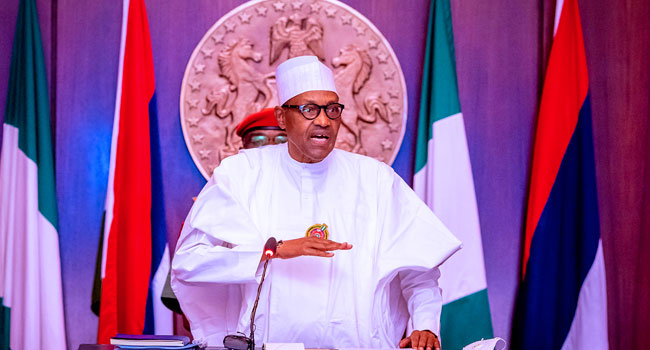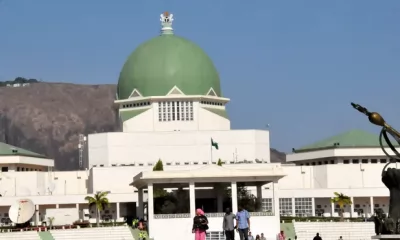Business & Economy
Senate receives Buhari’s request to amend 2022 Appropriation Act
Published
3 years agoon
By
News Editor
***As Executive budgets additional 2.557trn for petrol subsidy in 2022
The Senate has received a request from President Muhammadu Buhari to amend the 2022 Appropriation Act passed by the National Assembly in December, 2021.
The request was contained in a letter dated February 10, 2022, and read during plenary by the Senate President, Ahmad Lawan.
Accordingly, President Muhammadu Buhari in the letter said it was imperative to remove all capital projects that were replicated in the 2022 Appropriation Act.
He disclosed that 139 out of the 254 projects in the budget totaling N13.24 billion had been identified for deletion.
Buhari, therefore, requested the National Assembly to amend the Appropriation Act to provide for Capital Expenditures in the sum of N106,161,499,052 billion naira; and N43,870,592,044 billion naira for Recurrent Expenditures.
The President also requested that an additional provision for N2.557 trillion naira be appropriated by the National Assembly to fund the petrol subsidy in the 2022 Budget Framework which was revised to provide fully for PMS subsidy.
Buhari underscored the need to reinstate four capital projects totaling N1.4 billion in the Executive proposal for the Federal Ministry of Water Resources; and N22.0 billion cut from the provision for the Sinking Fund to retire mature loans needed to meet government’s obligations under already Issued Bonds.
The full text of the letter entitled, “SUBMISSION OF THE 2022 APPROPRIATION AMENDMENT PROPOSAL”, reads:
“As I indicated at the signing of the 2022 Appropriation Act, I forward herewith the Proposals for amendment of the 2022 Appropriation Act (as detailed in Schedules I-V), for the kind consideration and approval by the Senate.
“Let me seize this opportunity to once again express my deep gratitude to the leadership and members of the Senate for the expeditious consideration and passage of the 2022 Appropriation Bill as well as the enabling 2021 Finance Bill.
“It has become necessary to present this amendment proposal considering the impacts of the recent suspension of the Petroleum Motor Spirit (PMS) subsidy removal and the adverse implications that some changes made by the National
Assembly in the 2022 Appropriation Act could have for the successful implementation of the budget.
“It is important to restore the provisions made for various key capital projects in the 2022 Executive Proposal (see details in Schedule l) that were cut by the National Assembly. This is to ensure that critical ongoing projects that are cardinal to this administration, and those nearing completion, do not suffer a setback due
to reduced funding.
“It is equally important to reinstate the N25.81 billion cut from the provision for the Power Sector Reform Programme in order to meet the Federal Government’s commitment under the financing plan agreed with the World Bank.
“In addition, it is necessary to reinstate the four (4) capital projects totaling N1.42 billion in the Executive Proposal for the Federal Ministry of Water Resources that were removed in the 2022 Appropriation Act.
“Furthermore, there is critical and urgent need to restore the N3 billion cut from the provision made for payment of mostly long outstanding Local Contractors’ Debts and Other Liabilities as part of our strategy to reflate the economy and spur growth (see Schedule I).
“You will agree with me that the inclusion of National Assembly’s expenditures in the Executive Budget negates the principles of separation of Powers and financial autonomy of the Legislature. It is therefore necessary to transfer the National Assembly’s expenditures totaling N16.59 billion in the Service Wide Vote to National Assembly Statutory Transfer provision (see Schedule l).
“It is also imperative to reinstate the N22.0 billion cut from the provision for Sinking Fund to Retire Mature Loans to ensure that government can meet its obligations under already issued bonds as and when they mature.
“The cuts made from provisions for the recurrent spending of Nigeria’s Foreign Missions, which are already constrained, are capable of causing serious embarrassment to the country as they mostly relate to office and residential rentals.
“Similarly, the reductions in provisions for allowances payable to personnel of the Nigerian Navy and Police Formations and Commands could create serious issues for government. It is therefore imperative that these provisions be restored as proposed (see Schedule II).
“It is also absolutely necessary to remove all capital project is that replicated in the 2022 Appropriation Act; 139 out of the 254 such projects totaling N13.24 billion have been identified to be deleted from the budget.
“Some significant and non-mandate projects were introduced in the budgets of the Ministry of Transportation, Office of the Secretary to the Government of the Federation and Office of the Head of Civil Service of the Federation (see Schedule III). There are several other projects that have been included by the National Assembly in the budgets of agencies that are outside their mandate areas. The Ministry of Finance, Budget and National Planning has been directed to work with your relevant Committees to comprehensively identify and realign all such misplaced projects.
“It is also necessary to restore the titles / descriptions of 32 projects in the Appropriation Act to the titles contained in the Executive Proposal for the Ministry of Water Resources (see Schedule IV) in furtherance of our efforts to complete and put to use critical agenda projects.
“The Appropriation Amendment request is for a total sum of N106,161,499,052 (One hundred and six billion, one hundred and sixty-one million, four hundred and ninety-nine thousand, and fifty-two Naira only) for Capital Expenditures and N43,870,592,044 (Forty-three billion, eight hundred and seventy million, five hundred and ninety-two thousand, and forty-four Naira only) for Recurrent Expenditures. I therefore request the National Assembly to make the above amendments without increasing the budget deficit. I urge you to roll back some of the N887.99 billion of projects earlier inserted in the budget by the National Assembly to accommodate these amendments.
“However, following the suspension of the PMS subsidy removal, the 2022 Budget Framework has been revised to fully provide for PMS subsidy (see Schedule V). An additional provision of N2.557 trillion will be required to fund the petrol subsidy in 2022. Consequently, the Federation ACCOunt (Main Pool) revenue for the three tiers of government is projected to decline by N2.00 trillion, while FGN’s share from the Account is projected to reduce by N1.05 trillion. Therefore, the amount available to fund the FGN Budget is projected to decline by N969.09 billion.
“Aggregate expenditure is projected to increase by N45.85 billion, due to additional domestic debt service provision of N102.5 billion net of the reductions in Statutory Transfers by N56.67 billion, as follows: NDDC, by N12.61 billion from N102.78 billion to N90.18 billion; NEDC, by N5.90 bilion from N48.08 billion to N42.18 billion; UBEC, by N19.08 billion from N112.29 billion to N93.21 billion; Basic Health Care Fund, byN 9.54 billion from N56.14 billion to N46.60 billion; and NASENI, by N9.54 billion from N56.14 billion to N46.60 billion.
“Total budget deficit is projected to increase by N1.01 trillion to N7.40 trillion, representing 4.01% of GDP. The incremental deficit will be financed by new borrowings from the domestic market.
“Equally, it is imperative that Clause 10 of the 2022 Appropriation Act which stipulates that the Economic and Financial Crimes Commission (EFCC) and the Nigerian Financial Intelligence Unit (NFIU) are authorized to charge and defray from all money standing in credit to the units as revenues, penalties or sanctions at 10% for technical setup and operational cost at the units in this financial year be repealed.
“This clause is in conflict with the Act establishing these Agencies, as well as some other laws and financial regulations of the government. These are neither Revenue Generating Agencies nor Regulatory Bodies that generate revenue or charge penalty fees. They are fully funded (Personnel, Overhead and Capital) by Government through Budgetary provisions.
“The Fiscal Responsibility Act 2007, as well as the Finance Act 2021, require these Agencies to remit fully any recovered funds to the Consolidated Revenue Fund (CRF). This clause may lay a dangerous precedence, and spark clamours for similar treatment by other anti-corruption agencies.
“Also, the Clause 11 which stipulates that “Notwithstanding the provisions of any other law in force, Nigerian Embassies and Missions are authorised to expend funds allocated to them under the Capital components without having to seek approval of the Ministry of Foreign Affairs” should likewise be repealed. It too is inconsistent with extant Financial Regulations and the Public Procurement Act, which set thresholds for approving officers and Parastatal / Ministerial Tenders Boards for awards of Contracts for the procurement of goods and Services. This also amounts to an intrusion of the Legislature into what is an executive function.
“Given the urgency of the request for amendments, I I seek the cooperation of the National Assembly for expeditious legislative action on the 2022 Appropriation Amendment Proposal in order to sustain the gains of an early passage of the budget.
“Please accept, Distinguished Senate President, the assurances of my highest consideration.”
You may like
Business & Economy
Protests In Abuja Demanding Investigation Into Guaranty Trust Bank Operations
Published
1 week agoon
October 15, 2024By
News Editor
A protest was held today at the Police Force Headquarters in Abuja, organized by the Coalition of Civil Society for Good Governance in Nigeria, calling for an urgent investigation into serious allegations against Guaranty Trust Bank Limited (GTB). The bank, under the leadership of Segun Agbaje, is facing accusations of corruption, money laundering, unsolicited account openings, and more.
The Chief Convener of the coalition, Comrade Tijani Usman addressed the crowd, highlighting the pervasive issue of corruption that has plagued Nigeria’s socio-economic landscape since 1960. He emphasized the critical role of the banking sector in economic development and criticized the lack of action from regulatory and law enforcement agencies regarding GTB’s alleged infractions.
“The allegations against GTB are serious and cannot be ignored,” Usman stated. He urged the Nigeria Police Force to prioritize these claims and conduct a thorough investigation to hold accountable those responsible for any wrongdoing.
Participants in the protest voiced their concerns about recent operational failures at GTB, particularly a prolonged outage of the bank’s payment systems, which resulted in substantial losses for customers. The coalition called for the bank’s management to focus on resolving these critical issues instead of engaging in activities that undermine trust.
The protesters also appealed to the Central Bank of Nigeria and the Economic and Financial Crimes Commission to take a proactive stance in investigating the allegations and ensuring accountability within the banking sector.
As the coalition continues its peaceful demonstrations, they remain steadfast in their commitment to advocating for justice for affected customers and investors. This protest reflects a growing demand for greater transparency and accountability in Nigeria’s banking system, as civil society seeks to foster an environment where corruption is actively challenged and addressed.
The response from authorities to this protest may significantly impact the future governance of financial institutions in Nigeria, highlighting the necessity for reform and vigilance in the fight against corruption.
Business & Economy
Renewable Energy Stakeholders Advocates Sustainable Financing Model
Published
1 week agoon
October 15, 2024By
News Editor
Stakeholders in the renewable energy sector have called for a sustainable financing model to ensure attainment of Nigeria’s Energy Transition Programmes (ETP).
The stakeholders made the call in Abuja on Tuesday at a stakeholders engagement on the nation’s energy transition programme.
They were of the view that financing, especially private sector finance mobilisation was key in execution of ETP programmes in Nigeria.
The programme with the theme titled “Maximizing Just Energy Transition Opportunities through ban Inclusive Country Platform was organised by the Yar’ Adua Foundation.
Mr Patrick Okigbo of Nextier Advisory Energy Transition Limited, an energy transition advocated for a funding model that was sustainable.
He said the nation could adopt model like the petroleum development funding model where funds from petroleum proceeds could be dedicated to drive ETP.
He also said the sustainable financing could only be attained with the support of the private sector, saying that government can not totally fund the ETP.
“here should be clear financial and comprehensive plan to attract private financing.”
According to him, energy security should be considered as critical along side national security in Nigeria.
He said efforts should be made to place the people and the communities at the centre of ETP.
“To achieve energy transition in Nigeria, we must place the people and communities at the heart of every activity and discussion of energy transition programmes, engaging them to understand their needs.
“Creating community based ETP strategy to address negative impact in ETP.
“We need to strengthen government commitment and leadership on ETP,with strong political will, more commitment, more action and less talks.”
He said government must work toward addressing the micro economic uncertainties , address infrastructure challenges and ensure provision of infrastructure for renewable energy development.
“We must drive stakeholders collaboration to minimise resistance and foster trust.*
Mr Olumide Onitekun of African Policy Research Institute(APRI) advocated the use of just energy transition for ETP in Nigeria.
He said just energy transition was all about defunding fossil fuels in a way that reduces inequality, while prioritising economic, racial, and gender justice.
He, however, said the plan required political will, private sector collaboration and programmed funding approach.
Earlier, the Director Partnership and Development ,Yar’ Adua Foundation, Mr Amara Nwankpa said the ETP , while ambitious does not align with a least cost pathway to total electrification.
He said there was need to envision a different future , one where renewable energy would drive economic growth, job creation and expanded energy access.
High point of the event was a panel discussion on ensuring an inclusive and equitable energy transition opportunities and challenges.
Others were presentation of stakeholders commitments on next steps to energy transition programmes in Nigeria.
Business & Economy
Nigeria Officially Commences Crude Oil Sales In Naira
Published
2 weeks agoon
October 7, 2024By
News Editor
Nigeria has officially commenced the sales of crude oil and refined petroleum products in naira, the Federal Government has announced.
The Minister of Finance and Coordinating Minister of the Economy, Wale Edun, on Saturday said that in line with the Federal Executive Council (FEC) directive, the sale of the products in naira commenced on October 1.
This was disclosed in a statement by the Director of the Information and Public Relations, Ministry of Finance, Mohammed Manga.
“Following a meeting of the Implementation Committee, Chaired by the Honourable Minister of Finance and Coordinating Minister of the Economy to conduct a post-commencement review of the Crude Oil and Refined Products Sales in Naira initiative, the commencement of this strategic initiative was affirmed by key stakeholders,” the statement read.
“The meeting brought together prominent figures, including the Honourable Minister of State, Petroleum (Oil), the Special Adviser to the President on Revenue, the Special Adviser to the President on Energy, the Chief Executive of the Nigerian Midstream and Downstream Petroleum Regulatory Authority (NMDPRA), the representative of the Chairman of Dangote Group, the Vice President of Dangote Group, and the management of the Nigerian National Petroleum Company (NNPC), led by the Group Chief Executive Officer (GCEO), Chief Financial Officer (CFO), and Executive Vice President (Downstream).”
Manga noted that the strategic initiative and bold step taken by President Bola Tinubu-led administration is expected to have a lasting impact on Nigeria’s economy, enhancing growth, stability, and self-sufficiency.
He added that the country continues to navigate the complexities of global markets, and the strategic move positions Nigeria for success in the future.
The move comes about nine weeks after the FEC approved a proposal by Tinubu directing the NNPC to sell crude oil to Dangote Petroleum Refinery and other refineries in naira.
The Federal Government had said the sale of crude oil to the Dangote refinery and other refineries in naira would commence on October 1.
The policy aims to stabilise pump prices, potentially resulting in lower and more predictable fuel costs for consumers.
With transactions in Naira rather than dollars, the pressure on foreign exchange reserves would ease, leading to the stabilization of the dollar-Naira exchange rate and control inflation.
It would also increase the capacity of local refining that will in turn reduce dependence on imported fuel, saving billions of dollars that can be reinvested into other areas of the economy.
The government’s move would also boost local refining capacity to strengthen Nigeria’s energy security by ensuring a more reliable and self-sufficient fuel supply.
Latest News


Tinubu, FEC Scrap Niger Delta, Sports Development Ministries
SharePresident Bola Tinubu and the Federal Executive Council (FEC) have scrapped the Niger Delta Ministry, and the Ministry of Sports...


Immigration Arrests ‘Fleeing’ Bobrisky At Seme Border
ShareThe Nigeria Immigration Service (NIS) has confirmed the arrest of controversial crossdresser Idris Okuneye also known as Bobrisky at the...


Car Thief Storms National Assembly , Steals Staff Car
Share…As Nation’s Parliament Gets New Serjeant-at-arms Boss A yet-to-be identified thief entered the National Assembly premises on Wednesday 9th October,...


Tragedy As 94 Die In Jigawa Petrol Tanker Explosion
ShareA petrol tanker exploded at Majiya Town, Taura Local Government Area, Jigawa State In a devastating incident on Wednesday morning,...


Ondo Poll: ‘Police Fully Committed To Impartiality’, Says IGP
ShareThe Nigerian Police Force has said it would ensure that the upcoming governorship election in Ondo State is void of...
